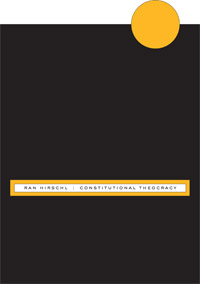Prof. Ran Hirschl has published a new book, Constitutional Theocracy (Harvard University Press, 2010).
From the publisher:
At the intersection of two sweeping global trends - the rise of popular support for principles of theocratic governance, and the spread of constitutionalism and judicial review - a new legal order has emerged: constitutional theocracy. It enshrines religion and its interlocutors as "a" or "the" source of legislation, and at the same time adheres to core ideals and practices of modern constitutionalism. A unique hybrid of apparently conflicting worldviews, values, and interests, constitutional theocracies thus offer an ideal setting-a "living laboratory" as it were-for studying constitutional law as a form of politics by other means. In this book, Ran Hirschl combines insights from legal theory, economics, theology, and political sociology with a rigorous comparative analysis of religion-and-state jurisprudence from dozens of countries worldwide to explore the evolving role of constitutional law and courts in a non-secularist world.
Counter-intuitively, Hirschl argues that the constitutional enshrinement of religion is a rational, prudent strategy that allows opponents of theocratic governance to talk the religious talk without walking most of what they regard as theocracy's unappealing, costly walk. Many of the jurisdictional, enforcement, and cooptation advantages that gave religious legal regimes an edge in the pre-modern era, are now aiding the modern state and its laws in its effort to contain religion. The "constitutional" in a constitutional theocracy thus fulfils the same restricting function it carries out in a constitutional democracy: it brings theocratic governance under check, and assigns to constitutional law and courts the task of a bulwark against the threat of radical religion.
Constitutional Theocracy further demonstrates that precisely because the canonical constitutional scripture has certain religion-like aspects to it, it may be better positioned than blunter, more forceful means, to effectively control and pacify principles of theocratic governance. In that respect, Hirschl argues, constitutionalism might very well emerge, or perhaps has already emerged as tomorrow's "opiate of the masses".
Reviews
"Ran Hirschl proves himself to be among the leading scholars of comparative constitutionalism writing today, and his signal contribution is to develop and analyze a distinctive form of constitutional polity, "constitutional theocracy." Anyone interested in the interaction of law and society will certainly need to read this book and will find themselves fascinated by the stories about developments in Iran, Pakistan, India, Israel, and Turkey, to name only five of the countries Hirschl analyzes in depth."
- Sanford Levinson, University of Texas at Austin School of Law
"A tour de force. Ran Hirschl's powerful analysis convincingly demonstrates that constitutionalism encompasses constitutional theocracy as well as constitutional democracy, that constitutional theocracy is becoming a dominant form of constitutionalism globally, and that this conflation of constitutional and religious values may have underappreciated virtues (and vices)."
- Mark Graber, University of Maryland School of Law
"Inevitably this book will raise hackles - given its critically important subject how could it be otherwise? But Hirschl is learned in exposition and acute in analysis. He demonstrates the same superb comparative skills familiar from his previous classic."
- JHH Weiler, Editor-in-Chief, I-CON The International Journal of Constitutional Law

